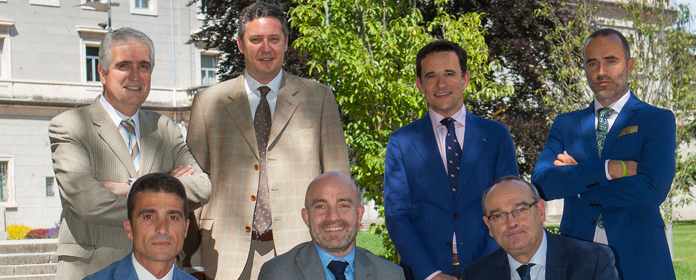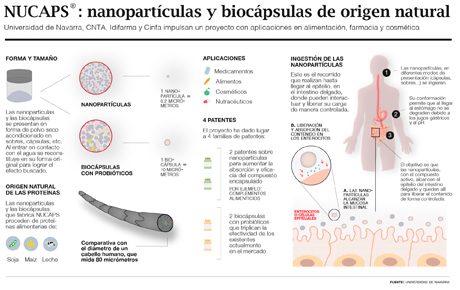Business consortium launches NUCAPS: nanoparticles and biocapsules of natural origin
The University of Navarra, CNTA, Cinfa and Idifarma have promoted a new company that will transfer four patent families to the market.

PHOTO: Manuel Castells
A consortium formed by CNTA(National Center for Technology and Food Safety), Cinfa Laboratories, Idifarma and the University of Navarra has given rise to NUCAPS, a company dedicated to the design, development and manufacture of nanoparticles and biocapsules for probiotics that have their origin in food proteins from milk, soy and corn.
The entrepreneurial process, led by Innovation Factory - Innovation and Entrepreneurship Center of the University of Navarra - has culminated with the constitution of this new business , which will be directed by Mariano Oto and has been participated by CNTA, Idifarma and the academic center. In addition, the capital fund "UN research and development+iTech Transfer", managed by core topic Mayor, will provide financial support to the company.
NUCAPS will be dedicated to development and the manufacture of protein-based nanoparticles of natural origin (with an approximate size of 200-300 nanometers) and biocapsules with probiotics (with a size of around 10 µm), all of them with numerous applications in the food/nutrition, dermocosmetics and pharmaceutical sectors, protected through four patent families. It is expected that NUCAPS will establish technology agreements with client companies for licence and will develop its own products, applying the technologies in its portfolio.
As detailed by one of the researchers who has led the project, Professor Juan Manuel Irache, from the School of Pharmacy and Nutrition, "from proteins that are found naturally in food (for example, in milk, soy or corn), and by simple and versatile procedures, they are transformed into small vehicles that can house bioactive compounds beneficial to health - such as vitamins, polyphenols or omega 3 - in their interior. The final product is presented in the form of a powder, dispensed in capsules or sachets which, when mixed with water before administration, recovers its original form so that our body can absorb it".
"In the case of biocapsules with probiotics (microorganisms with positive effects on health), NUCAPS will make it possible to double or triple their shelf life (they are very labile bacteria, not very stable during storage) and make it easier for them to reach the intestine, since most of the probiotics ingested are often destroyed in the stomach and do not reach the intestine in sufficient quantity", emphasizes Carlos Javier González Navarro, director of Innovation of the research center in Nutrition of the University of Navarra and promoter of project.
Transfer to the industrial fabricHéctor Barbarin, director of CNTA, considers that NUCAPS is an "excellent example of knowledge transfer to the industrial fabric" to offer, in this case, better solutions in the encapsulation of ingredients: "In the agri-food sector, fundamental for the Economics of the Autonomous Community, the technology we have developed is going to provide foods with a high added value, since thanks to the encapsulation of ingredients and probiotic bacteria it is possible to eliminate unwanted odors and flavors, preserve aromas, transform liquid ingredients into solids, increase their stability during storage and processing, improve bioavailability in the organism so that tighter doses can be offered, etc.".
Julio Maset, director scientist at Laboratorios CINFA, adds that microencapsulation using proteins based on food additives "allows this technique to be used in areas other than drugs, and confers properties to the encapsulated substance that would be difficult to incorporate in any other way. Even in drugs, the employment of these proteins can avoid excipients, modify the release of a substance in our body and even protect these substances and give them other innovative characteristics".
From Idifarma, its general director , Luis Oquiñena, highlights the joint work of the four promoting entities: "This partnership has allowed us to successfully develop a project in which the three fundamental pillars of research and development are combined: science, technology and business. Therefore, for Idifarma, the birth of NUCAPS is an extraordinary opportunity for development in the form of a technological platform that provides innovative proposals for high added value sectors, such as pharmaceuticals and nutraceuticals".
Fernando de la Puente, director of research and development of the University of Navarra, highlights how the idea and the consortium started as a new model of partnership University-business, "which has put as the basis of this venture a technological platform that is the result of research carried out at the University at partnership with CNTA".
NUCAPS started in 2007 as a project Euroinnova between CNTA and the University of Navarra to research on functional foods and continued with other lines for the development of nanoparticles and the encapsulation of bioactive compounds, thanks to the support of the Ministry of Competitiveness and the Government of Navarra. During this period, biocapsules with probiotics were added, on which numerous researchers from the National Center for Food Technology and Safety (CNTA) and department of Pharmacy and Pharmaceutical Technology of the University of Navarra have been working over the years.





